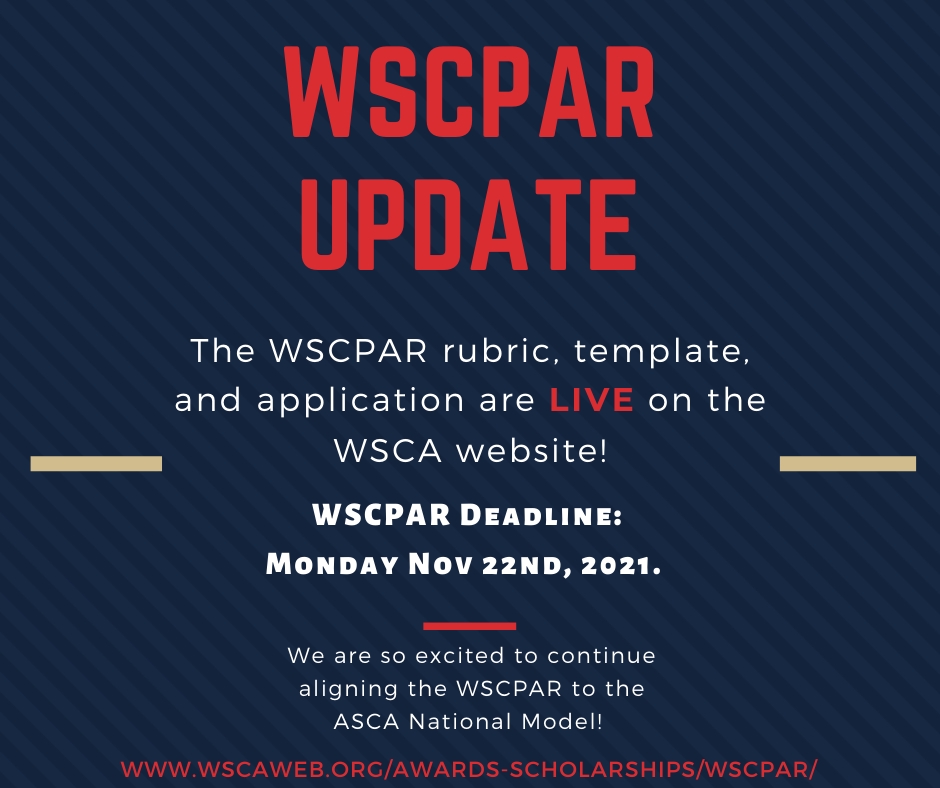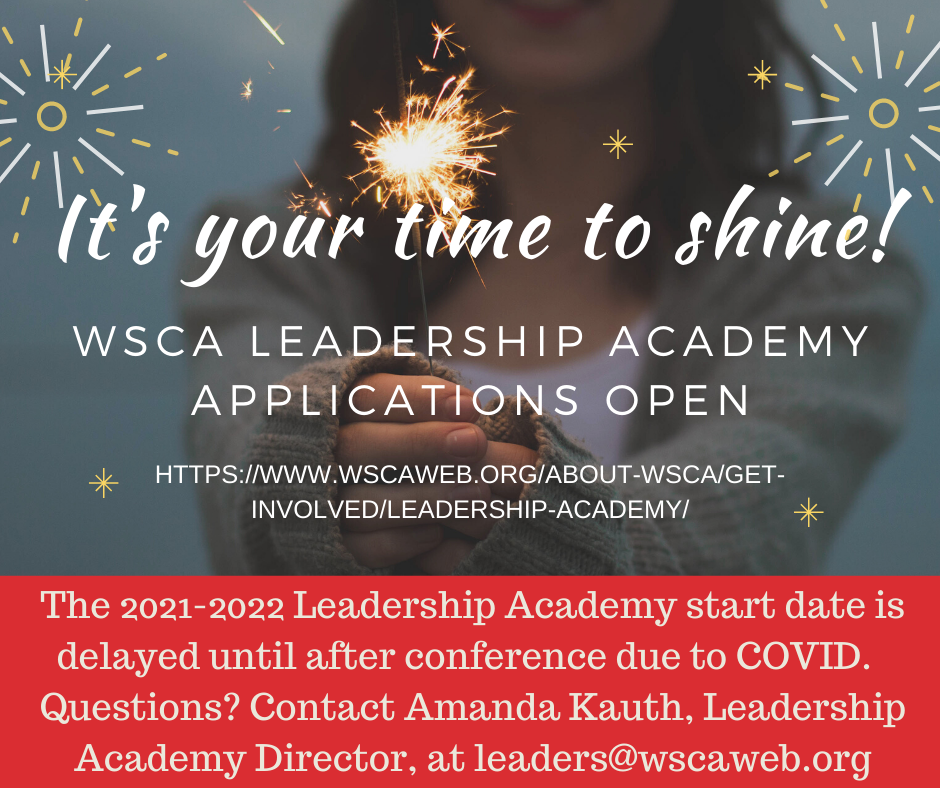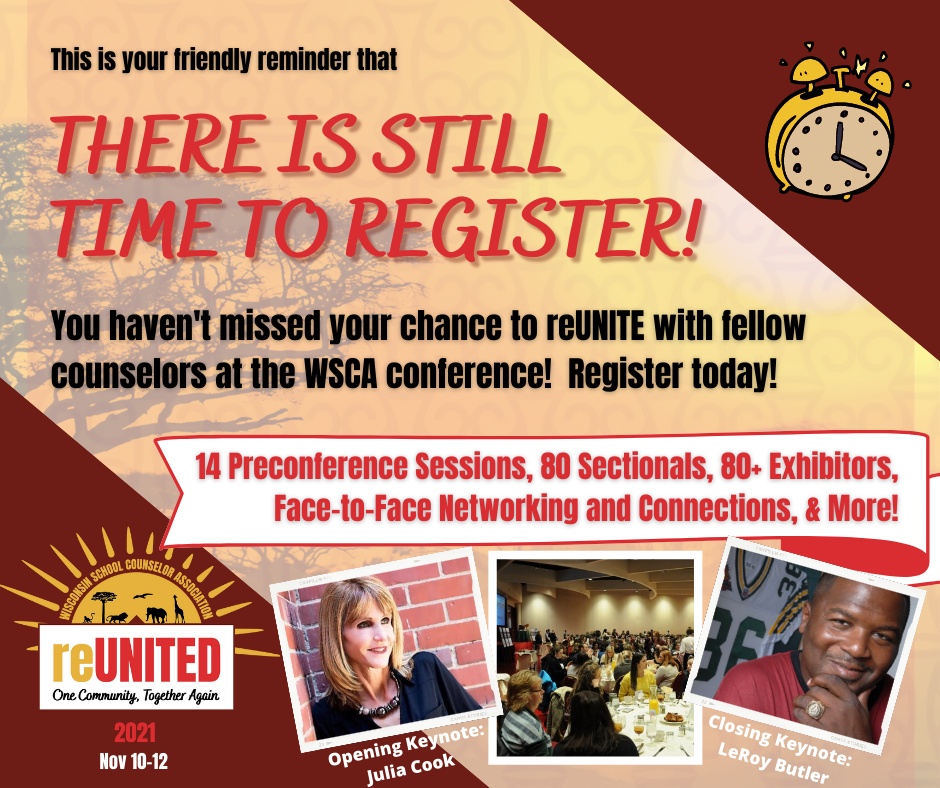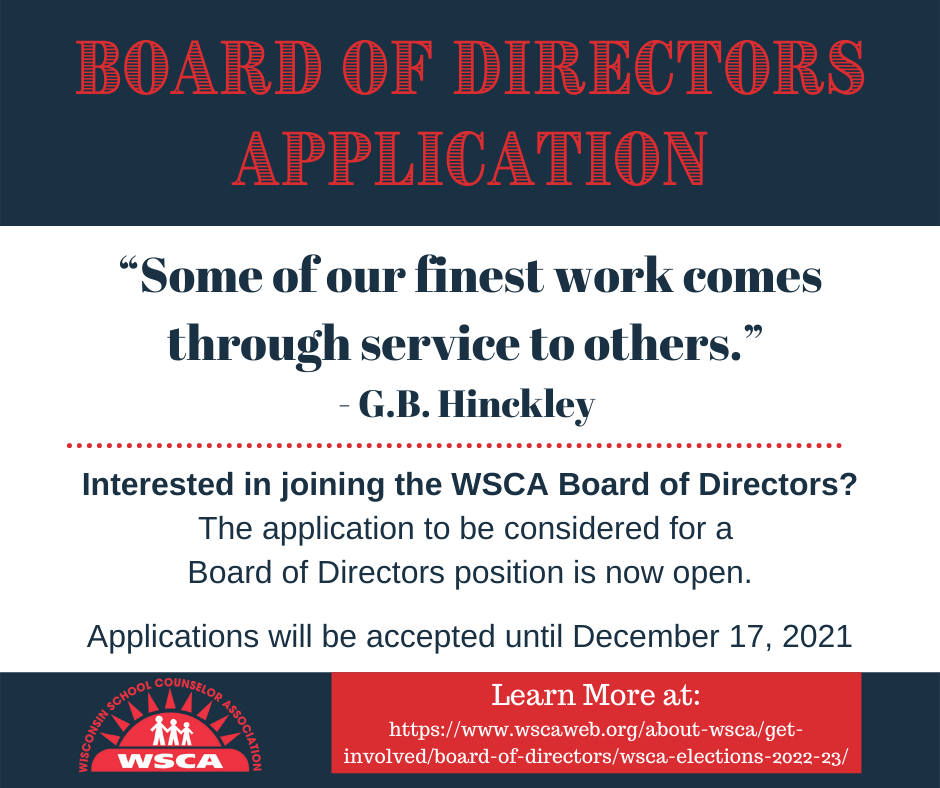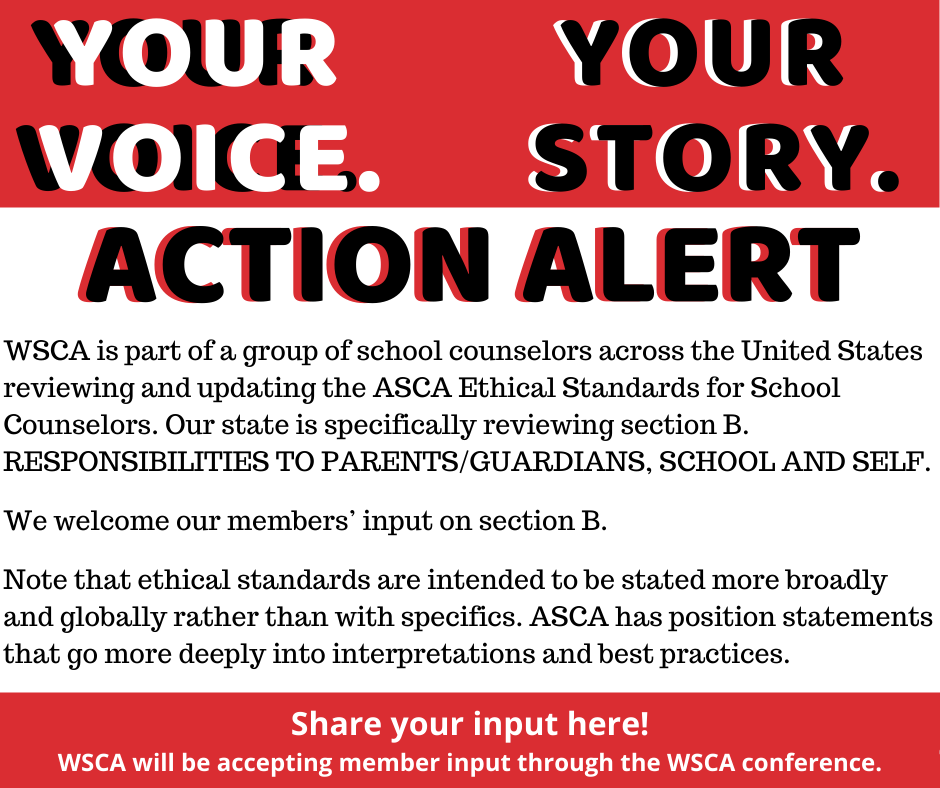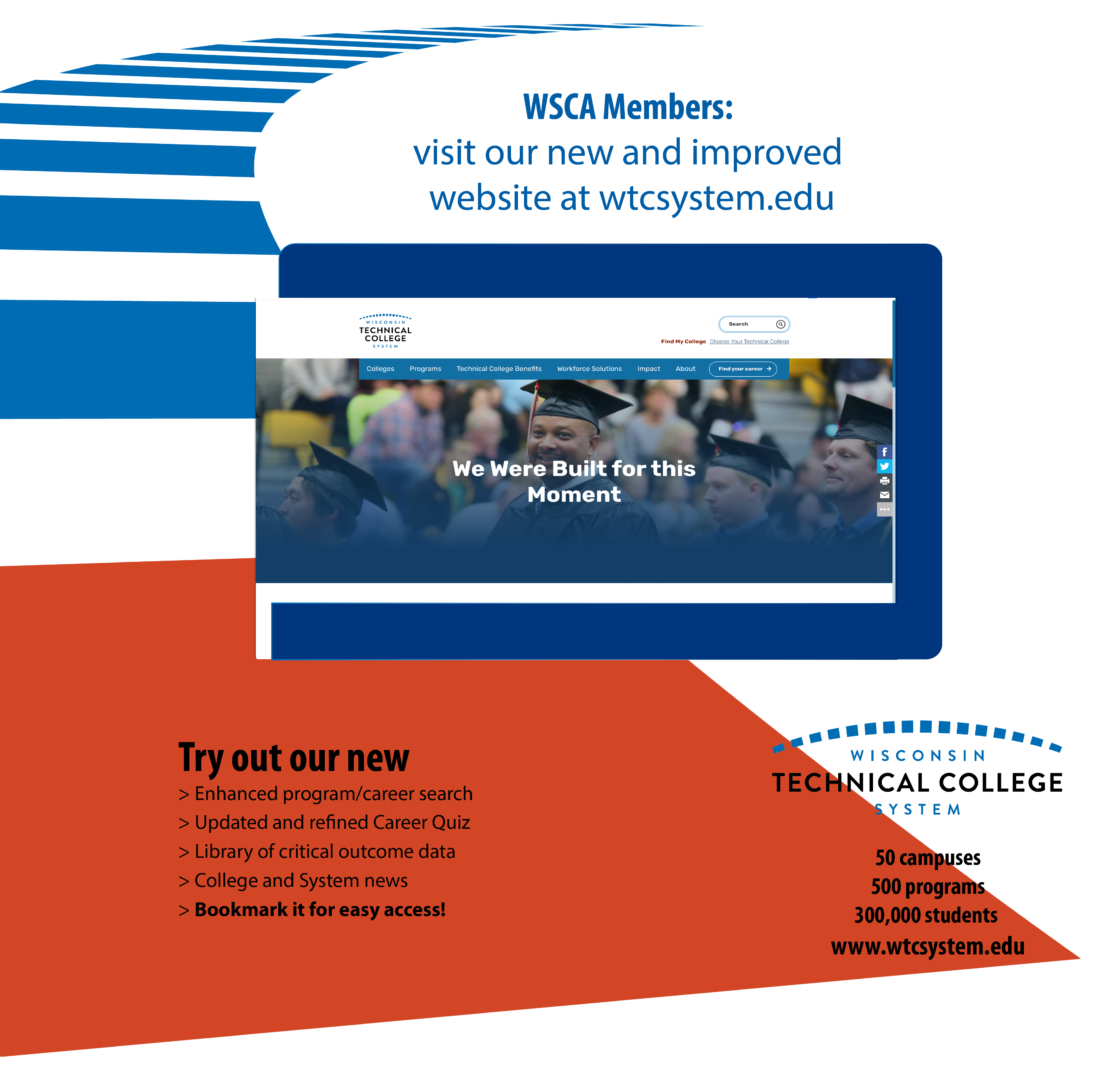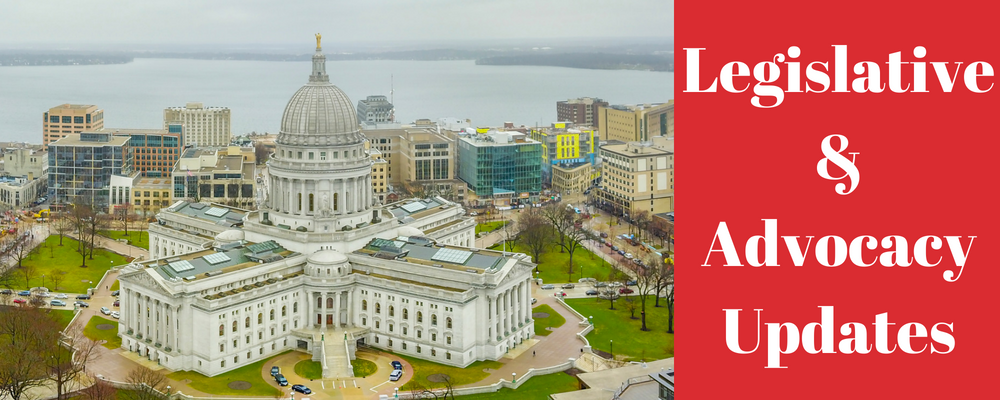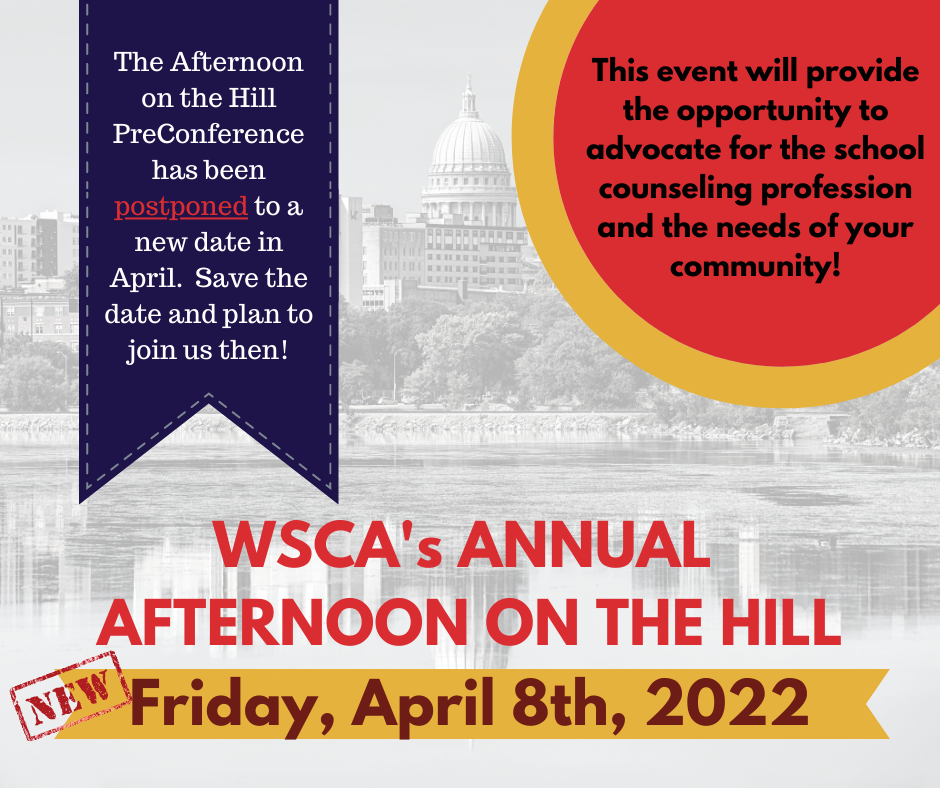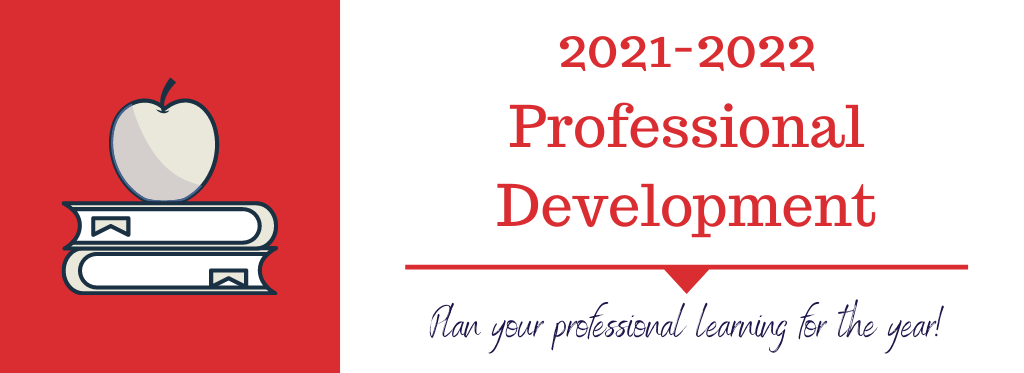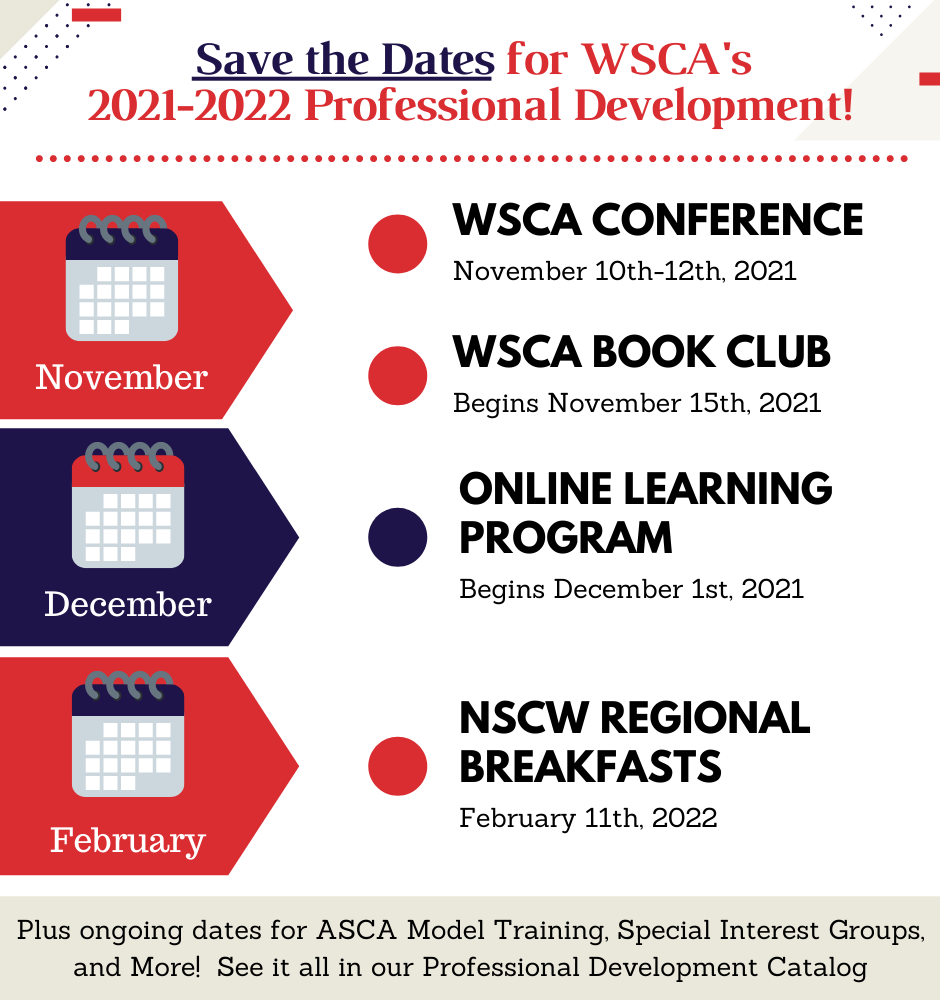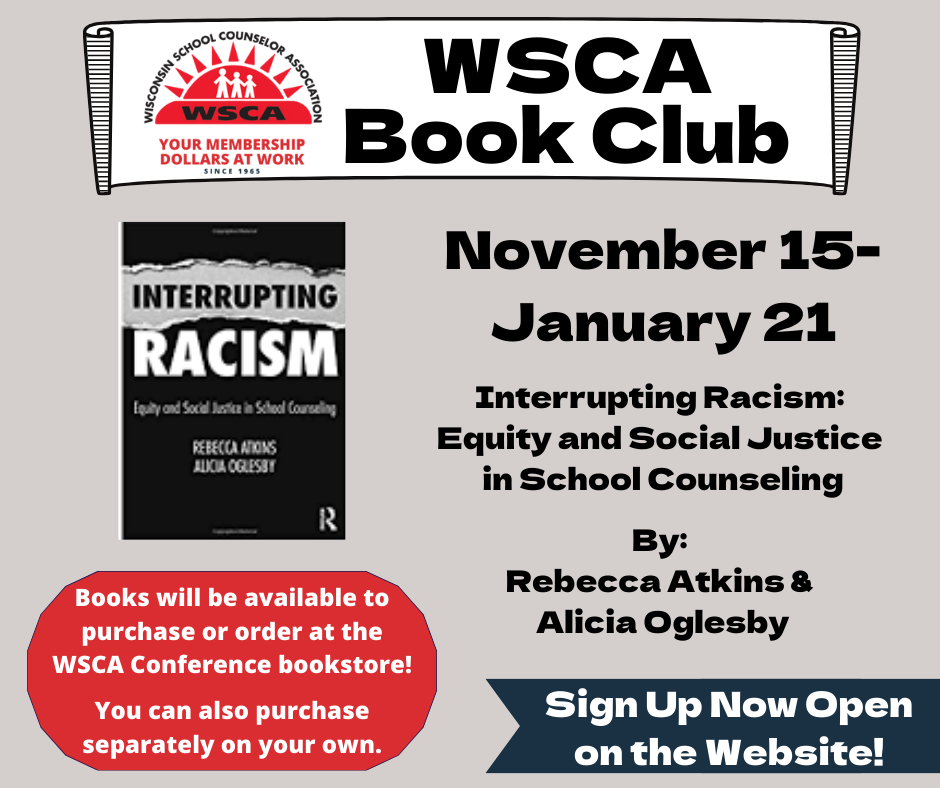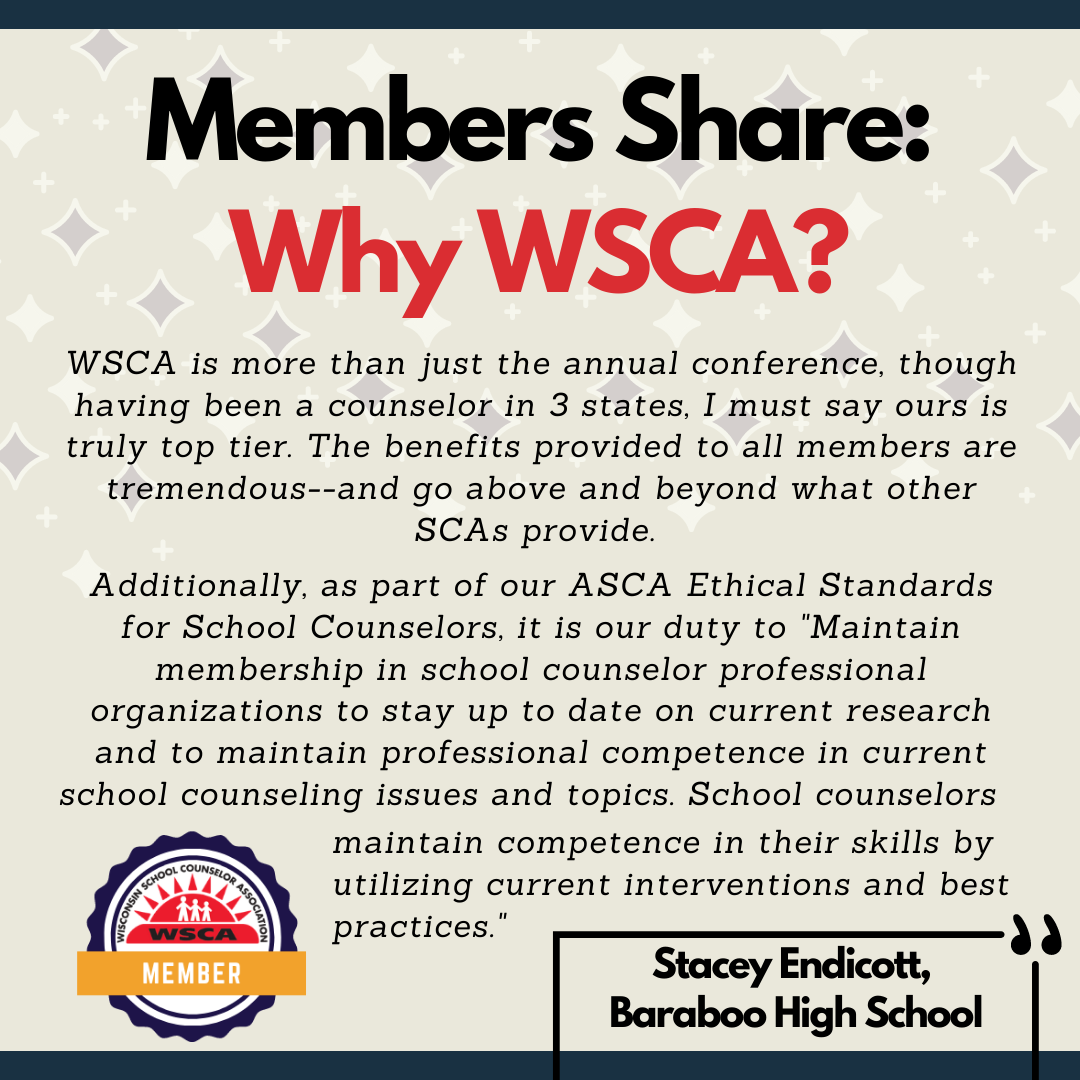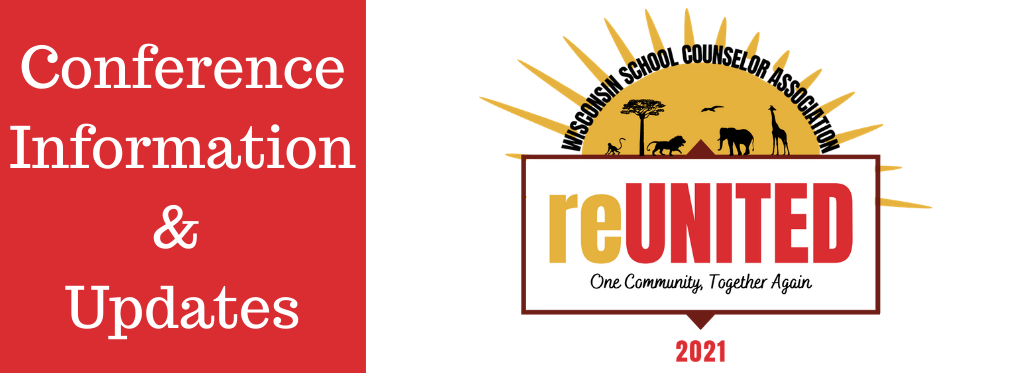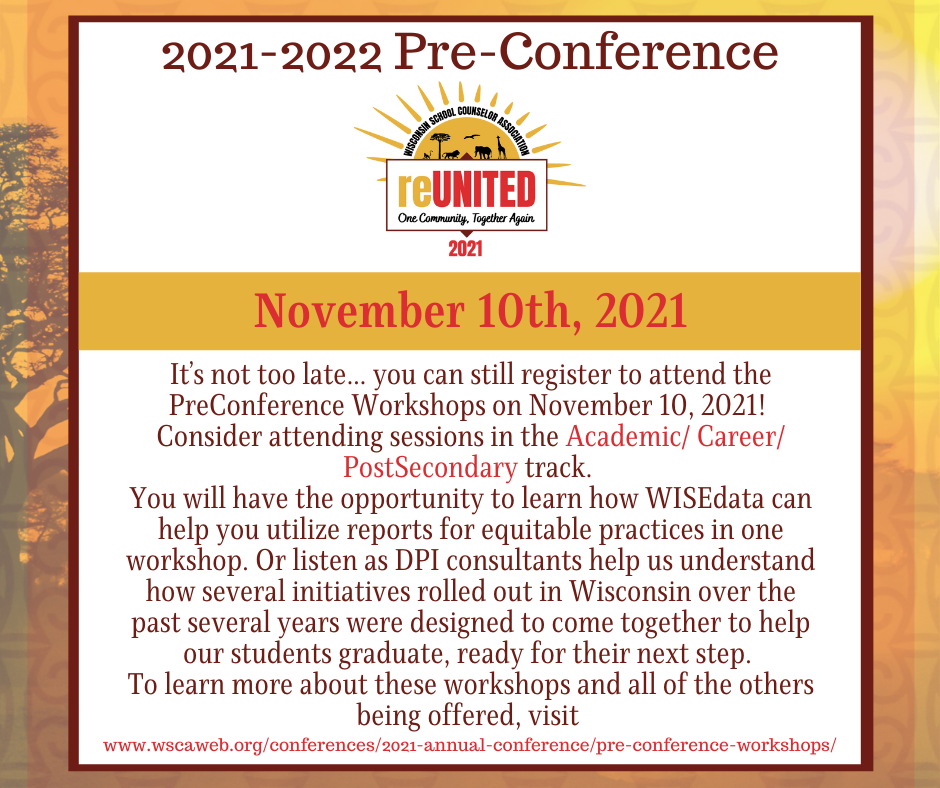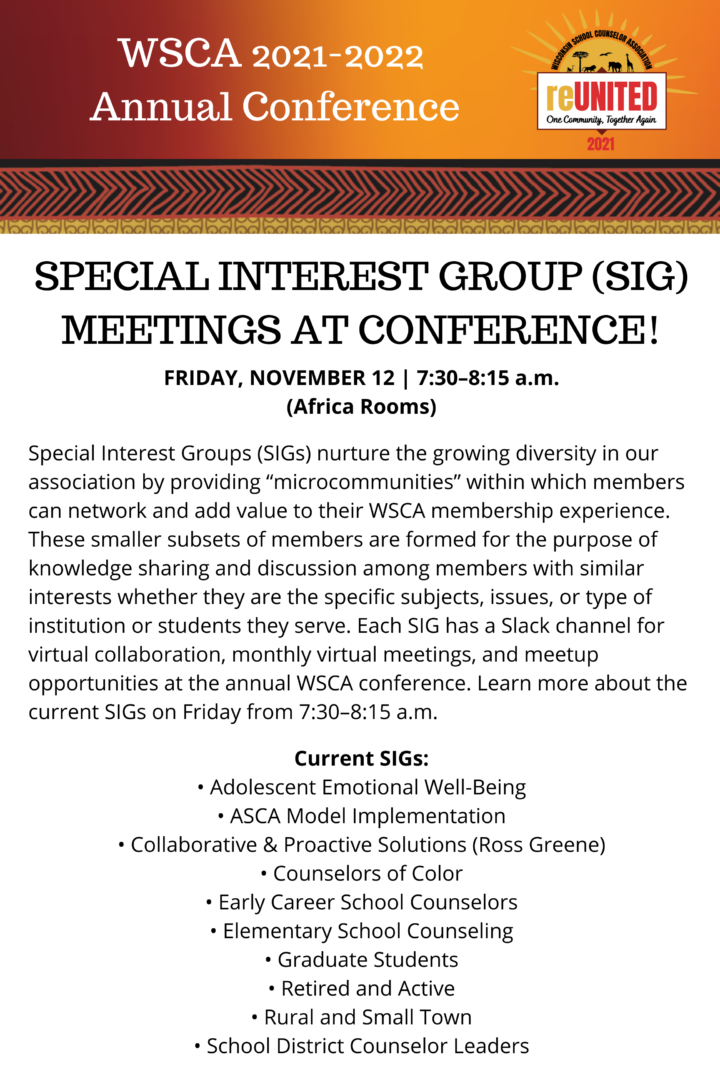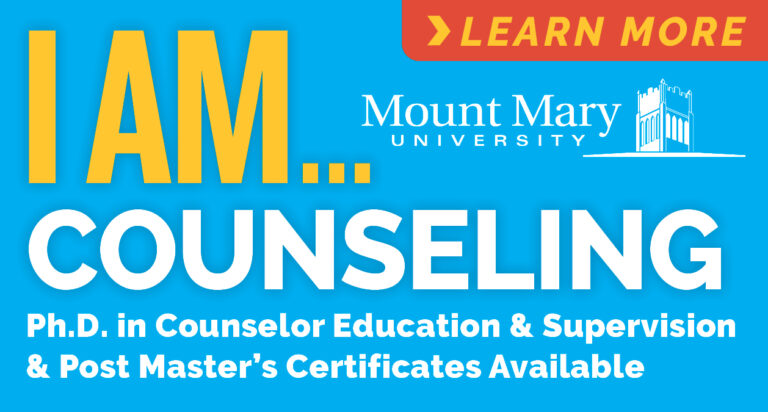November 2021

A Message from the WSCA Executive Director

Dear WSCA Members,
I can’t even begin to tell you all how excited I am to see everyone at the conference next week! ReUNITED is a fitting theme to our conference as we come together during some of the toughest times in recent educational history. Brené Brown writes about how as a society we are moving to being more isolated and the impact this has on our emotional well being. Let’s not get caught up in the busyness but take the time we need to connect and build relationships not just personally but professionally for our own mental wellness. Seeing and connecting with all of you most definitely fills my bucket!
While our focus this month is our largest event of the year, we often say that WSCA is more than our conference. One way the WSCA board holds me accountable for making sure I am doing my job is by reviewing monitoring reports. Every year, I write and submit an ENDS monitoring report that gives a summary of how the organization took steps towards reaching the ENDS established by the board. I would encourage you to read the report as it gives a summary of the entire organization and how we strive to meet the needs of counselors in our state, you can find the report here https://www.wscaweb.org/wp-content/uploads/2021/11/WSCA-ENDS-Report-2021-website.pdf.
WSCA is also continuing to make changes to how we operate. We are striving towards creating better systems for communication and member assistance, increased members only content and the opportunity for you to customize the resources to meet your needs. What we need from you is to tell your counseling friends and colleagues about why you are a WSCA member. When we are advocating, educating and representing counselors in Wisconsin, counselors give our organization credibility through the percentage/numbers that are members! WSCA is one of the strongest school counselor associations in the United States, this is only possible with the support and engagement of our members.
~Stacy
A Message from the WSCA Board of Directors

I hope you have all settled into your new school year despite the many challenges that typically occur and those, like Covid, that we were hoping to leave behind.
The board recently met for our quarterly meeting and also to hear how we can support the Directors of Operations, especially the conference committee, as they prepare for an amazing conference. We were able to check-out our new conference location and hear about all of the fun and engaging things planned to help Wisconsin School Counselors Re-Unite!
The board’s focus has always been based on our Ends policies—making sure WSCA delivers what it promises to the owners, you the members. Part of this process is learning from our stakeholders and key partners in the work that we do. After presentations from WIPPS (Wisconsin Institute for Public Policy and Service, a unit of the University of Wisconsin System) and OCMH (Office of Children’s Mental Health) the board was able to participate in a Q & A session with each organization.
WIPPS received funding to research how Wisconsin middle and high school students were coping with school, learning, and life in general during Covid-19. There were 10 focus groups for middle school students from 24 different counties, 38 different geographic regions (rural, urban, and suburban) who attended 40 different middle schools. There were 96 high school students who participated from 29 different counties, 46 geographical regions and 56 different high schools. Overall, the issues reported by students were pervasive and consistent across location and learning type (in-person, virtual, and hybrid). The majority of students appreciated having their voice heard.
One of the things I found notable was that many students weren’t sure who to reach out to for help with their mental health needs. Those who thought of the school counselor as an option perceived that the school counselors were too busy to help. Students also identified stigma as a reason why they didn’t seek help when struggling. We often hear that school counselors feel that administrators don’t understand what the role of the school counselor should be (or the training in mental health that we received in our graduation programs), and overall what a valuable resource we are, if used appropriately within our schools. It turns out that our students could also use some education on who they can turn to in a time of need and what support we could offer them. To read the report summary, go to wipps.org/voices
The OCMH reported that what they are hearing and seeing in their work mirrors the results of the WIPPS study. They stress the importance of creating a welcoming environment for all students. Given that the Wisconsin suicide rate is higher than the national average as is the reports of in person bullying, it’s not surprising that one of our focuses should be (and already is in many schools) building social connectedness and a sense of belonging. There are many resources available on their website, https://children.wi.gov/ if you’d like to learn more.
In continuing with our focus on equity, the board looks forward to attending the variety of sessions on social justice and equity at pre-conference. We also have the opportunity to participate in follow-up discussions with some of the speakers during dinner.
One of the most important set of voices that we’d like to hear from is our members! Please join us for the lunch-time listening sessions on Thursday at conference. We will be breaking into small groups and have a list of questions to spark conversation but feel free to bring any thoughts or ideas that are percolating in your brain!
We look forward to Re-Uniting with you in November at the Kalahari!
~Tricia Norby, WSCA Board Chair
Why You Should Apply for the WSCA Board of Directors
A Video Message from Steve Schneider, WSCA Board Member
Find all the application details at https://www.wscaweb.org/about-wsca/get-involved/board-of-directors/wsca-elections-2022-23/

Feature Article – Incorporating Anti-Racism into MTSS
Incorporating Anti-Racism into MTSS
Jennifer Betters-Bubon
University of Wisconsin-Whitewater, associate professor
& Anne Garvey Shah
University of Wisconsin-Whitewater, adjunct instructor
Now more than ever, school counselors must integrate culturally sustaining and anti-racist ideals into their work. According to ASCA position statement of anti-racist school counselor practices, school counselors: “engage in anti-racist actions by advocating to change racist policies, procedures, practices, guidelines and laws contributing to inequities in students’ academic, career and social/emotional development.”
One promising way school counselors can organize anti-racist efforts is through Multi-tiered Systems of Support (MTSS). Multi-tiered Systems of Support (MTSS) is an evidence-based framework used in K-12 education. With a focus on what we do for all (Tier 1), some (Tier 2) and few (Tier 3) students as well as how we create systems for staff, MTSS offers a structure through which counselors can intentionally integrate anti-racist efforts.
Because it can be daunting to create systems change, we constructed a list of ideas to use at the individual, school counseling and schoolwide levels.
To create antiracist systems, individuals who are co-creating systems must engage in critical self-examination. To facilitate awareness at the individual level:
- Self Awareness Reflection. What is my culture? How does my culture tint my experiences and my perspectives? When is my opinion coming from a place of privilege? How does unconscious bias and systemic racism affect how I view and treat others? What biases do I hold, and how can I challenge those biases?
- Reading. Counselors can help facilitate awareness in self and others through providing learning resources and/or leading book clubs (see resources).
- Training. Counselors can help embed antiracism into new staff training, beginning of the year training, and all ongoing PD days.
In addition, counselors should reflect on their school counseling programs to determine whether all students have access and support through a School Counseling Equity Audit that examines:
- Referrals:
- Who is referred to see the counselor? Who self-refers? Who is referred to the office (for discipline) vs. the counselor (for support)?
- How are you decreasing stigma in different groups associated with seeing the counselor?
- Tiered Interventions. Who receives and benefits from counselor interventions — individually, groups, and referrals to outside resources?
- Belonging, Representation and Equity
- Who feels welcome in your office?
- Who is represented on your promotional materials?
- Which families do you communicate with regularly, and how well is your method of communication working?
- How are you decreasing disproportionality through your School Counseling programming?
Finally, the school as a larger system should be reviewed by members of equity teams or MTSS Leadership Teams. This schoolwide equity audit may include examination of:
- Data Disproportionality — Over- or under- representation of a specific group in any category, program or service including (for example):
- Discipline
- Advanced/Gifted Programming
- Special Education
- Staff Diversity
- Truancy
- Failures/Non-promotion
- Post-secondary Enrollment
- Family Conferences/Engagement
- After-School Activities
- Qualitative Data: Counselors and equity teams can hold focus groups for students and families on school policies and practices
While by no means an exhaustive list, we hope you will leave with 1-2 ideas you can try tomorrow–to build more equitable and antiracist systems in your school community.
Resources/References
American School Counselor Association (2021). The School Counselor and Anti-Racist Practices Position Statement. https://www.schoolcounselor.org/Standards-Positions/Position-Statements/ASCA-Position-Statements/The-School-Counselor-and-Anti-Racist-Practices
Reading list
- Kendi’s Antiracist Reading List
- Powells’ Antiracist Reading
- Harvard’s Racial Justice, Racial Equity and Anti-Racism Reading ListLink to free
Resources for audits
- https://maec.org/equity-audit/#pdf
- Mid-Atlantic Equity Consortium (MAEC, Inc.) Equity Audit
- https://www.nea.org/resource-library/opportunity-audit
- National Education Association (NEA) Opportunity Audit
You Spoke, We Listened
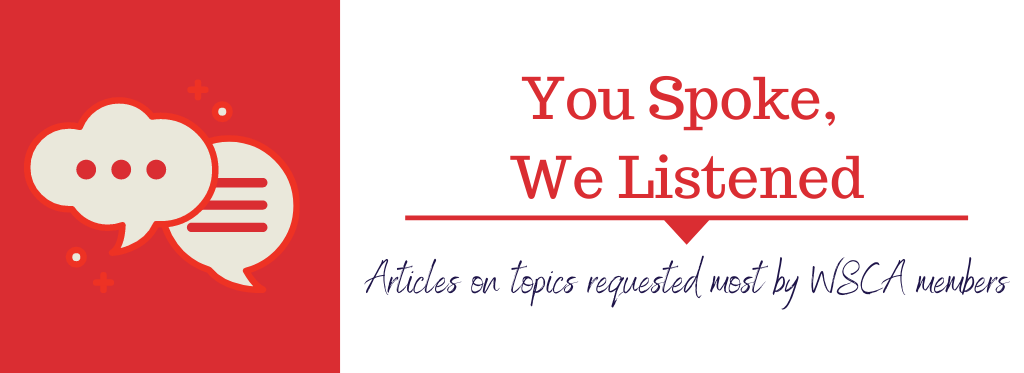
![]()
“The Network” from DPI, Native American Heritage Month
Did you know that DPI supports a project called the Disproportionality Technical Assistance Network, “the Network”? The Network is a multi-tiered system of compliance activities and improvement supports to address racial disproportionality, particularly in special education.
You may be wondering how this relates to your work as a school counselor, as we don’t provide case management or typically evaluate students for special education services. What is important about disproportionality is all the work that needs to be happening in education systems before students are identified for special education, which is often the space where school counselors support students accessing their full educational opportunities.
The Network is hosting an amazing online learning series that includes state and national leaders centered on equity that is available to Wisconsin educators for free. You can learn more and register here https://www.thenetworkwi.com/upcomingevents.
–
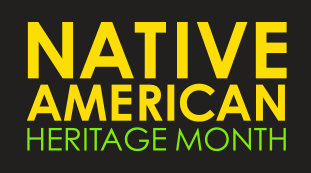
November is National American Indian Heritage Month. The Library of Congress, National Archives and Records Administration, National Endowment for the Humanities, National Gallery of Art, National Park Service, Smithsonian Institution and United States Holocaust Memorial Museum join in paying tribute to the rich ancestry and traditions of Native Americans. Learn more at https://nativeamericanheritagemonth.gov/
![]()
National Veterans and Military Families Month
November is National Veterans and Military Families Month. While we don’t often talk about our students impacted by having a parent that serves, it is important for school counselors to be aware of this factor in our students’ lives. Shelley Joan Weiss is the Wisconsin Commissioner for the Interstate Compact on Educational Opportunities for Military Children and shared that the Empowering the Military Teen just released a report that showed Military teens’ wellbeing is low. Learn more about the findings here https://www.militaryfamily.org/the-military-teen-experience/.
Additional resources
- Veterans Day – NOV 11 – Military.com
- November is Military Family Appreciation Month – Military.com
- November is Military Family Appreciation Month – National Military Family Association
- November is Military Veterans and Family Appreciation Month – Military One Source
![]()
FAFSA Resources for School Counselors and Families
Thank you to all the counselors that supported College Goal Wisconsin FAFSA completion events this year! While this is a tremendous resource in our state we know that not all of our students participated and/or not started their FAFSA. It is critical that school counselors support students in this very important step for a student to achieve their post secondary plans. You do NOT need to be an expert on financial aid to help your students! There are lots of resources available for you and your students and families. One of the first steps you can take is to make sure that your district/school has access to the Student Level FAFSA data through the DPI WISEdash for Districts portal, https://dpi.wi.gov/wisedash/districts/about-data/FAFSA. WSCA also hosted a webinar titled Financial Aid- FAFSA Student Level Data last year that is now available on demand in the member only section of the WSCA website https://www.wscaweb.org/member-only-content/on-demand-learning/.
Below are some additional resources and infographics that you can utilize to promote FAFSA completion in your schools:
The Department of Education has created a FAFSA toolkit just for counselors and you can search for resources based on the topic https://financialaidtoolkit.ed.gov/tk/index.jsp .
Resources in other languages can be found here https://financialaidtoolkit.ed.gov/tk/about/how-to.jsp#languages .
College Goal also hosted a webinar for counselors on the FAFSA. Check out the recording for this BRIEF video to learn the basics as you support your students and families. https://vimeo.com/641715241/da975045ad



